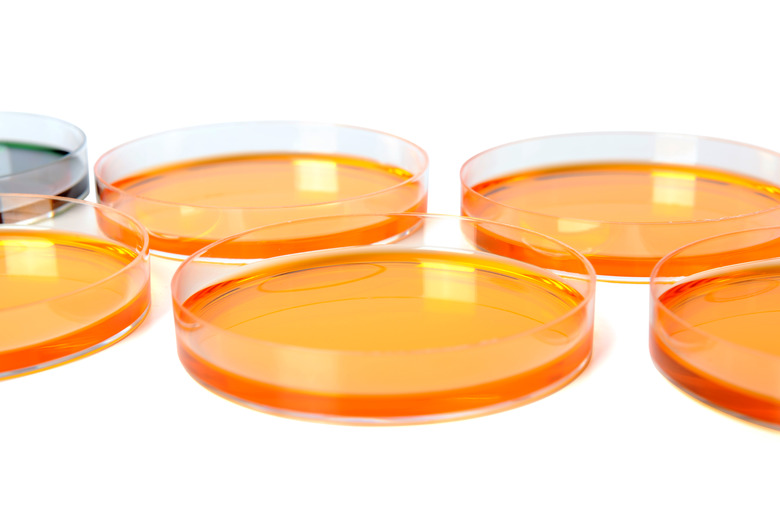The Difference Between Genomic DNA & Plasmid DNA
There are many intriguing differences between bacteria and other kinds of cells. Among these is the presence of plasmids in bacteria. These small, rubber-band-like loops of DNA are separate from bacterial chromosomes. So far as is known, plasmids are found only in bacteria and not other forms of life. And, they play an important role in modern biotechnology.
Bacterial Chromosomes
Bacterial Chromosomes
Although there are exceptions, most bacteria have a single circular chromosome. Most of a bacterium's genetic material is contained in this chromosome, which is only replicated or copied when the cell divides. However, the bacterium might also have one or more plasmids. Some plasmids replicate only when the cell divides, and others are copied at other times. There may be more than one copy of the same plasmid in a cell, especially if the plasmid replicates independently of cell division. Because DNA replication requires energy, a larger number of plasmids will consume more energy when the cell divides. If these plasmids confer a benefit such as antibiotic resistance, however, they may might more than make up for this burden in terms of the advantages they provide.
The most important differences between DNA in chromosomes and plasmids lie in where the genetic material is replicated and how mobile it is. Genes on a plasmid can be transferred between bacteria much more easily than chromosomal DNA.
Conjugation
Conjugation
Another interesting difference between plasmid and chromosomal DNA in bacteria is a process called conjugation. This process transfers plasmids between bacteria, sometimes between different species of bacteria that are only distantly related. The transferred plasmid might remain distinct and separate from the bacterial chromosome or become part of it. Plasmid transfer has been important in the rise of antibiotic resistance. Genes that confer antibiotic resistance are often found on plasmids and appear to have been transferred from one bacterial species or population to another.
Other Differences
Other Differences
In general, bacterial chromosomes typically have a higher coding density. This means that a greater proportion of the chromosome is active and provides instructions for protein production. Some plasmids might carry only a few genes, which means they are much smaller than the chromosome and have only a very limited number of functions.
Chromosomes generally carry core genes, which are involved in metabolism that is essential for the bacterium's survival and growth. Plasmids, on the other hand, tend carry useful functional "extras." These functional benefits include antibiotic resistance, detoxification of harmful substances or in the case of bacteria that cause disease, the ability to invade a host.
Significance
Significance
Plasmids have become hugely important tools in modern biotechnology. Molecular biologists often use plasmids to introduce genes into bacteria. First, they use enzymes to transform the loop-shaped plasmid into a linear form. Then, they splice the desired genes into the plasmid and use other enzymes to restore the plasmid's ring-like shape. Finally, they incubate the bacteria under conditions that will force the bacteria to incorporate some of the plasmids. These genetic engineering techniques are very useful to produce important proteins such as insulin and human growth hormone, which are used in modern medicine.
References
- Harvey Lodish, Arnold Berk et. al: Molecular Cell Biology, 2008
- Arizona State University: Mama Ji's Molecular Kitchen
- American Society for Microbiology: Mobility of Plasmids
- San Diego State University: Bacterial Chromosomes
Cite This Article
MLA
Brennan, John. "The Difference Between Genomic DNA & Plasmid DNA" sciencing.com, https://www.sciencing.com/difference-between-genomic-dna-plasmid-dna-2314/. 13 March 2018.
APA
Brennan, John. (2018, March 13). The Difference Between Genomic DNA & Plasmid DNA. sciencing.com. Retrieved from https://www.sciencing.com/difference-between-genomic-dna-plasmid-dna-2314/
Chicago
Brennan, John. The Difference Between Genomic DNA & Plasmid DNA last modified August 30, 2022. https://www.sciencing.com/difference-between-genomic-dna-plasmid-dna-2314/
